Contextual Factors Analysis: Knowledge Management, E-commerce Report
VerifiedAdded on 2019/11/29
|7
|2079
|295
Report
AI Summary
This report examines the impact of contextual factors, specifically knowledge management and e-commerce, on businesses, with a focus on the manufacturing industry, particularly UNIQUE PRODUCTION PRIVATE LIMITED. It defines contextual factors and explores the significance of knowledge management in enhancing decision-making, stimulating change, and fostering innovation within manufacturing firms. The report also highlights the benefits of e-commerce, such as creating personal catalogs, facilitating spare parts sharing, and improving brand image through web stores, especially in a B2B context. It concludes that integrating knowledge management systems and e-commerce platforms is highly beneficial for manufacturing companies, providing a competitive advantage and enhanced market reach. The report references various academic sources to support its findings.

CONTEXTUAL FACTORS
Paraphrase This Document
Need a fresh take? Get an instant paraphrase of this document with our AI Paraphraser
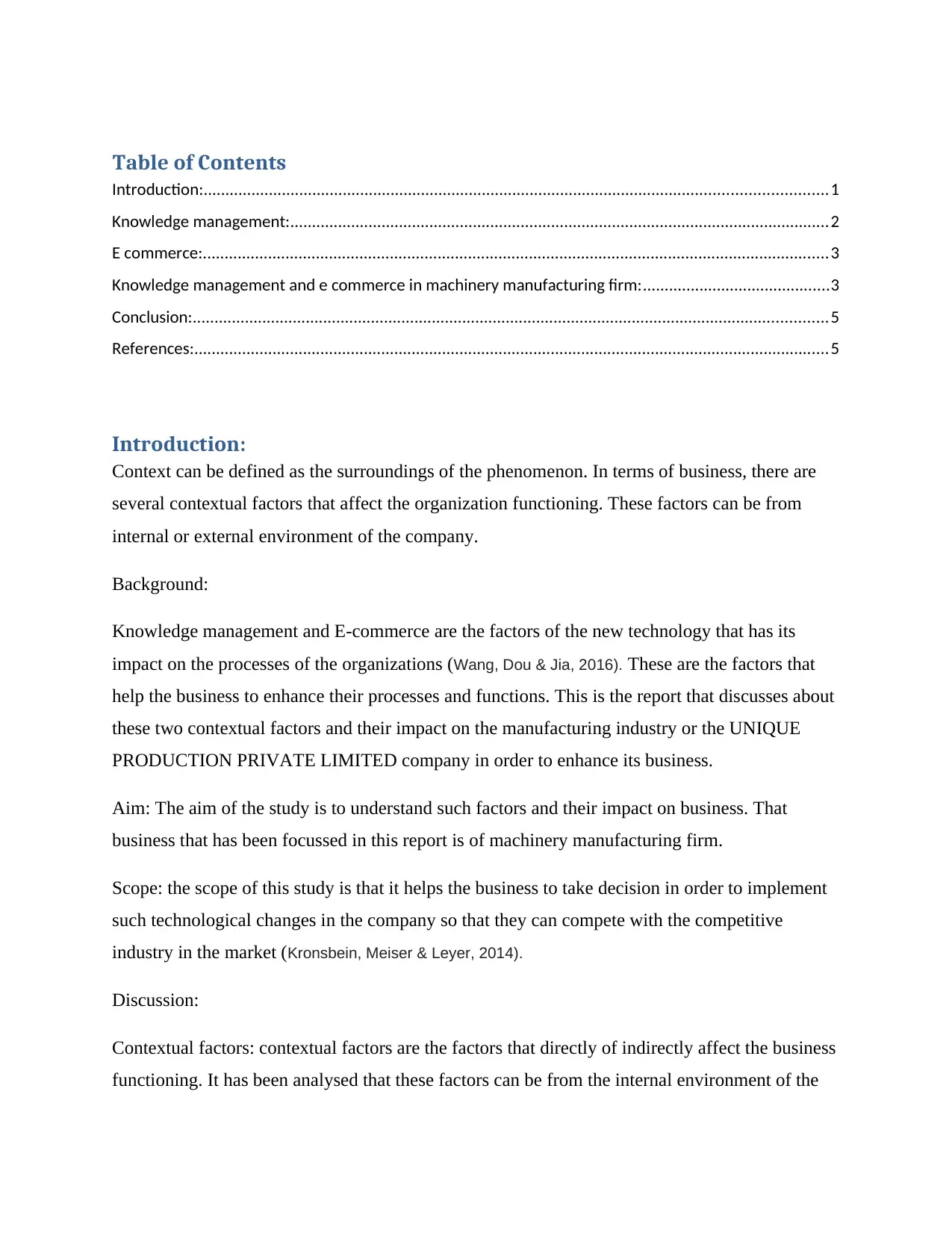
Table of Contents
Introduction:...............................................................................................................................................1
Knowledge management:............................................................................................................................2
E commerce:................................................................................................................................................3
Knowledge management and e commerce in machinery manufacturing firm:...........................................3
Conclusion:..................................................................................................................................................5
References:..................................................................................................................................................5
Introduction:
Context can be defined as the surroundings of the phenomenon. In terms of business, there are
several contextual factors that affect the organization functioning. These factors can be from
internal or external environment of the company.
Background:
Knowledge management and E-commerce are the factors of the new technology that has its
impact on the processes of the organizations (Wang, Dou & Jia, 2016). These are the factors that
help the business to enhance their processes and functions. This is the report that discusses about
these two contextual factors and their impact on the manufacturing industry or the UNIQUE
PRODUCTION PRIVATE LIMITED company in order to enhance its business.
Aim: The aim of the study is to understand such factors and their impact on business. That
business that has been focussed in this report is of machinery manufacturing firm.
Scope: the scope of this study is that it helps the business to take decision in order to implement
such technological changes in the company so that they can compete with the competitive
industry in the market (Kronsbein, Meiser & Leyer, 2014).
Discussion:
Contextual factors: contextual factors are the factors that directly of indirectly affect the business
functioning. It has been analysed that these factors can be from the internal environment of the
Introduction:...............................................................................................................................................1
Knowledge management:............................................................................................................................2
E commerce:................................................................................................................................................3
Knowledge management and e commerce in machinery manufacturing firm:...........................................3
Conclusion:..................................................................................................................................................5
References:..................................................................................................................................................5
Introduction:
Context can be defined as the surroundings of the phenomenon. In terms of business, there are
several contextual factors that affect the organization functioning. These factors can be from
internal or external environment of the company.
Background:
Knowledge management and E-commerce are the factors of the new technology that has its
impact on the processes of the organizations (Wang, Dou & Jia, 2016). These are the factors that
help the business to enhance their processes and functions. This is the report that discusses about
these two contextual factors and their impact on the manufacturing industry or the UNIQUE
PRODUCTION PRIVATE LIMITED company in order to enhance its business.
Aim: The aim of the study is to understand such factors and their impact on business. That
business that has been focussed in this report is of machinery manufacturing firm.
Scope: the scope of this study is that it helps the business to take decision in order to implement
such technological changes in the company so that they can compete with the competitive
industry in the market (Kronsbein, Meiser & Leyer, 2014).
Discussion:
Contextual factors: contextual factors are the factors that directly of indirectly affect the business
functioning. It has been analysed that these factors can be from the internal environment of the
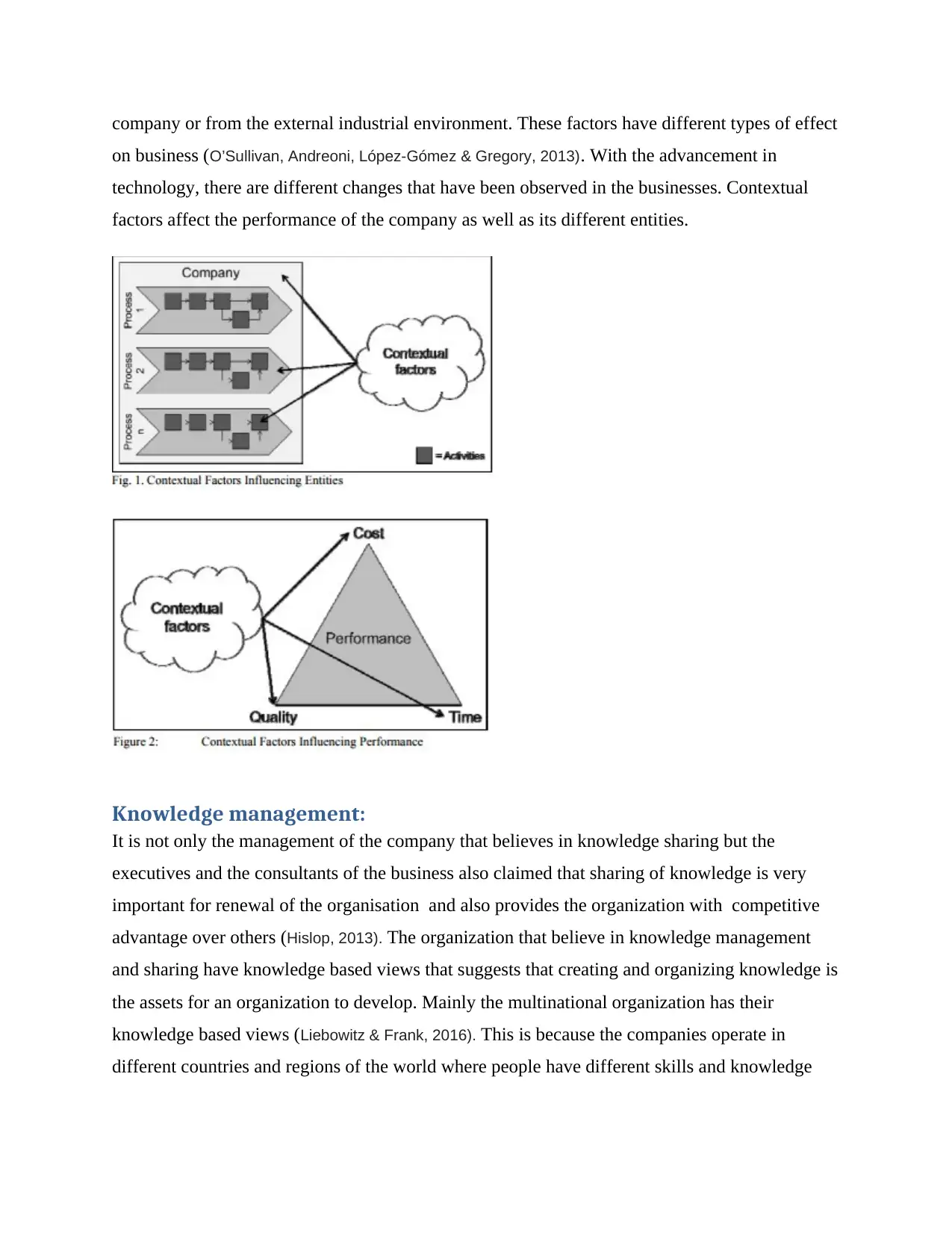
company or from the external industrial environment. These factors have different types of effect
on business (O’Sullivan, Andreoni, López-Gómez & Gregory, 2013). With the advancement in
technology, there are different changes that have been observed in the businesses. Contextual
factors affect the performance of the company as well as its different entities.
Knowledge management:
It is not only the management of the company that believes in knowledge sharing but the
executives and the consultants of the business also claimed that sharing of knowledge is very
important for renewal of the organisation and also provides the organization with competitive
advantage over others (Hislop, 2013). The organization that believe in knowledge management
and sharing have knowledge based views that suggests that creating and organizing knowledge is
the assets for an organization to develop. Mainly the multinational organization has their
knowledge based views (Liebowitz & Frank, 2016). This is because the companies operate in
different countries and regions of the world where people have different skills and knowledge
on business (O’Sullivan, Andreoni, López-Gómez & Gregory, 2013). With the advancement in
technology, there are different changes that have been observed in the businesses. Contextual
factors affect the performance of the company as well as its different entities.
Knowledge management:
It is not only the management of the company that believes in knowledge sharing but the
executives and the consultants of the business also claimed that sharing of knowledge is very
important for renewal of the organisation and also provides the organization with competitive
advantage over others (Hislop, 2013). The organization that believe in knowledge management
and sharing have knowledge based views that suggests that creating and organizing knowledge is
the assets for an organization to develop. Mainly the multinational organization has their
knowledge based views (Liebowitz & Frank, 2016). This is because the companies operate in
different countries and regions of the world where people have different skills and knowledge
⊘ This is a preview!⊘
Do you want full access?
Subscribe today to unlock all pages.

Trusted by 1+ million students worldwide
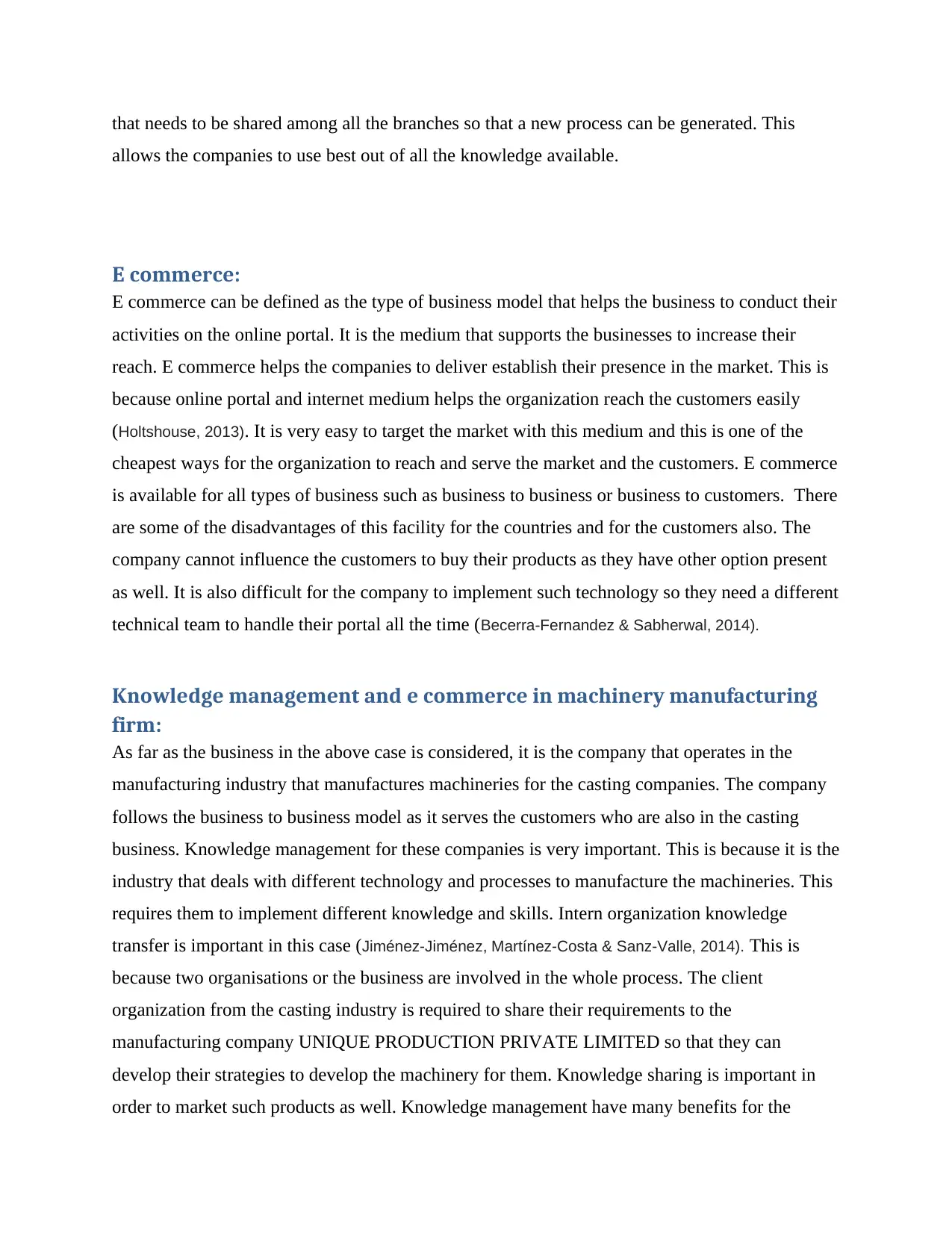
that needs to be shared among all the branches so that a new process can be generated. This
allows the companies to use best out of all the knowledge available.
E commerce:
E commerce can be defined as the type of business model that helps the business to conduct their
activities on the online portal. It is the medium that supports the businesses to increase their
reach. E commerce helps the companies to deliver establish their presence in the market. This is
because online portal and internet medium helps the organization reach the customers easily
(Holtshouse, 2013). It is very easy to target the market with this medium and this is one of the
cheapest ways for the organization to reach and serve the market and the customers. E commerce
is available for all types of business such as business to business or business to customers. There
are some of the disadvantages of this facility for the countries and for the customers also. The
company cannot influence the customers to buy their products as they have other option present
as well. It is also difficult for the company to implement such technology so they need a different
technical team to handle their portal all the time (Becerra-Fernandez & Sabherwal, 2014).
Knowledge management and e commerce in machinery manufacturing
firm:
As far as the business in the above case is considered, it is the company that operates in the
manufacturing industry that manufactures machineries for the casting companies. The company
follows the business to business model as it serves the customers who are also in the casting
business. Knowledge management for these companies is very important. This is because it is the
industry that deals with different technology and processes to manufacture the machineries. This
requires them to implement different knowledge and skills. Intern organization knowledge
transfer is important in this case (Jiménez-Jiménez, Martínez-Costa & Sanz-Valle, 2014). This is
because two organisations or the business are involved in the whole process. The client
organization from the casting industry is required to share their requirements to the
manufacturing company UNIQUE PRODUCTION PRIVATE LIMITED so that they can
develop their strategies to develop the machinery for them. Knowledge sharing is important in
order to market such products as well. Knowledge management have many benefits for the
allows the companies to use best out of all the knowledge available.
E commerce:
E commerce can be defined as the type of business model that helps the business to conduct their
activities on the online portal. It is the medium that supports the businesses to increase their
reach. E commerce helps the companies to deliver establish their presence in the market. This is
because online portal and internet medium helps the organization reach the customers easily
(Holtshouse, 2013). It is very easy to target the market with this medium and this is one of the
cheapest ways for the organization to reach and serve the market and the customers. E commerce
is available for all types of business such as business to business or business to customers. There
are some of the disadvantages of this facility for the countries and for the customers also. The
company cannot influence the customers to buy their products as they have other option present
as well. It is also difficult for the company to implement such technology so they need a different
technical team to handle their portal all the time (Becerra-Fernandez & Sabherwal, 2014).
Knowledge management and e commerce in machinery manufacturing
firm:
As far as the business in the above case is considered, it is the company that operates in the
manufacturing industry that manufactures machineries for the casting companies. The company
follows the business to business model as it serves the customers who are also in the casting
business. Knowledge management for these companies is very important. This is because it is the
industry that deals with different technology and processes to manufacture the machineries. This
requires them to implement different knowledge and skills. Intern organization knowledge
transfer is important in this case (Jiménez-Jiménez, Martínez-Costa & Sanz-Valle, 2014). This is
because two organisations or the business are involved in the whole process. The client
organization from the casting industry is required to share their requirements to the
manufacturing company UNIQUE PRODUCTION PRIVATE LIMITED so that they can
develop their strategies to develop the machinery for them. Knowledge sharing is important in
order to market such products as well. Knowledge management have many benefits for the
Paraphrase This Document
Need a fresh take? Get an instant paraphrase of this document with our AI Paraphraser
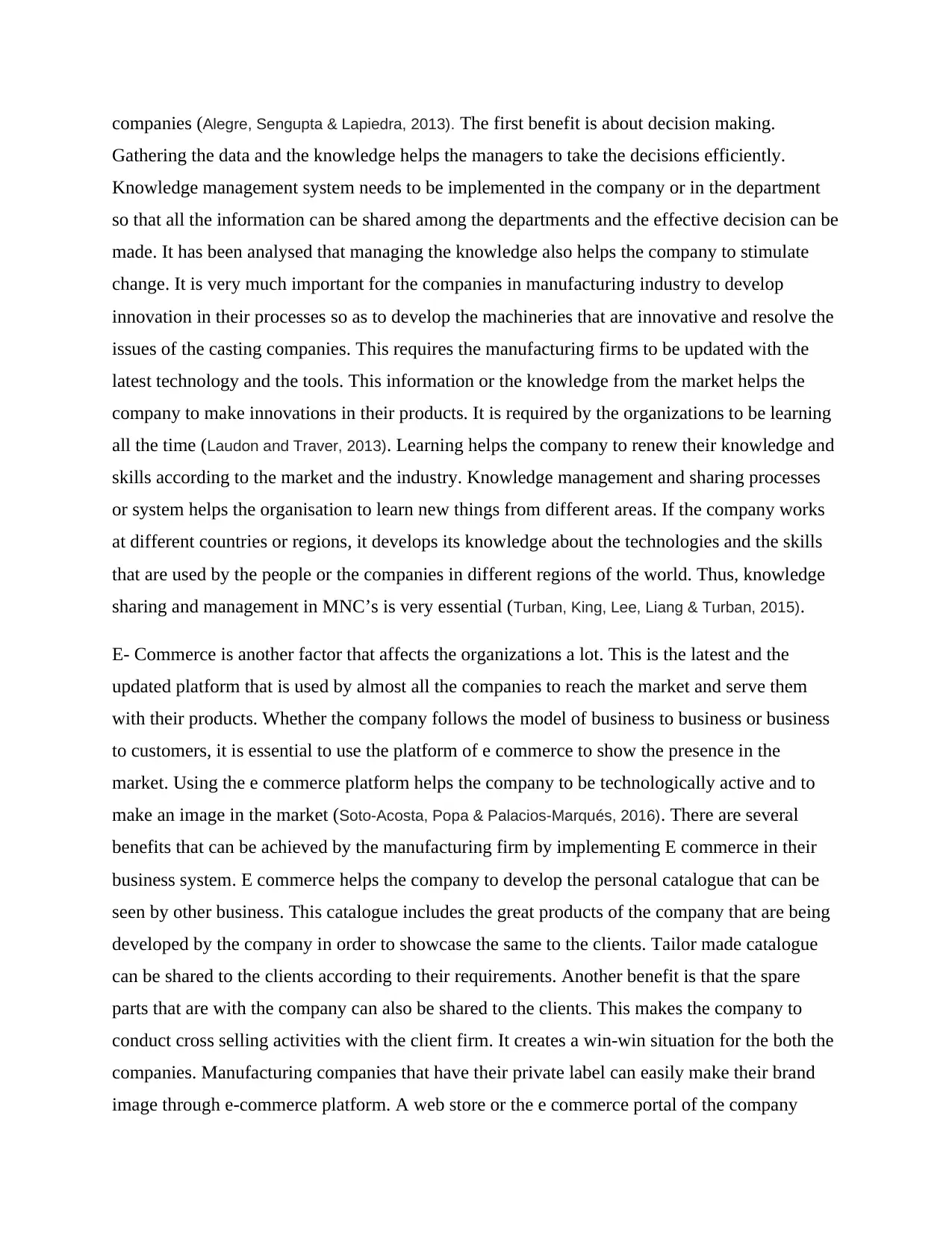
companies (Alegre, Sengupta & Lapiedra, 2013). The first benefit is about decision making.
Gathering the data and the knowledge helps the managers to take the decisions efficiently.
Knowledge management system needs to be implemented in the company or in the department
so that all the information can be shared among the departments and the effective decision can be
made. It has been analysed that managing the knowledge also helps the company to stimulate
change. It is very much important for the companies in manufacturing industry to develop
innovation in their processes so as to develop the machineries that are innovative and resolve the
issues of the casting companies. This requires the manufacturing firms to be updated with the
latest technology and the tools. This information or the knowledge from the market helps the
company to make innovations in their products. It is required by the organizations to be learning
all the time (Laudon and Traver, 2013). Learning helps the company to renew their knowledge and
skills according to the market and the industry. Knowledge management and sharing processes
or system helps the organisation to learn new things from different areas. If the company works
at different countries or regions, it develops its knowledge about the technologies and the skills
that are used by the people or the companies in different regions of the world. Thus, knowledge
sharing and management in MNC’s is very essential (Turban, King, Lee, Liang & Turban, 2015).
E- Commerce is another factor that affects the organizations a lot. This is the latest and the
updated platform that is used by almost all the companies to reach the market and serve them
with their products. Whether the company follows the model of business to business or business
to customers, it is essential to use the platform of e commerce to show the presence in the
market. Using the e commerce platform helps the company to be technologically active and to
make an image in the market (Soto-Acosta, Popa & Palacios-Marqués, 2016). There are several
benefits that can be achieved by the manufacturing firm by implementing E commerce in their
business system. E commerce helps the company to develop the personal catalogue that can be
seen by other business. This catalogue includes the great products of the company that are being
developed by the company in order to showcase the same to the clients. Tailor made catalogue
can be shared to the clients according to their requirements. Another benefit is that the spare
parts that are with the company can also be shared to the clients. This makes the company to
conduct cross selling activities with the client firm. It creates a win-win situation for the both the
companies. Manufacturing companies that have their private label can easily make their brand
image through e-commerce platform. A web store or the e commerce portal of the company
Gathering the data and the knowledge helps the managers to take the decisions efficiently.
Knowledge management system needs to be implemented in the company or in the department
so that all the information can be shared among the departments and the effective decision can be
made. It has been analysed that managing the knowledge also helps the company to stimulate
change. It is very much important for the companies in manufacturing industry to develop
innovation in their processes so as to develop the machineries that are innovative and resolve the
issues of the casting companies. This requires the manufacturing firms to be updated with the
latest technology and the tools. This information or the knowledge from the market helps the
company to make innovations in their products. It is required by the organizations to be learning
all the time (Laudon and Traver, 2013). Learning helps the company to renew their knowledge and
skills according to the market and the industry. Knowledge management and sharing processes
or system helps the organisation to learn new things from different areas. If the company works
at different countries or regions, it develops its knowledge about the technologies and the skills
that are used by the people or the companies in different regions of the world. Thus, knowledge
sharing and management in MNC’s is very essential (Turban, King, Lee, Liang & Turban, 2015).
E- Commerce is another factor that affects the organizations a lot. This is the latest and the
updated platform that is used by almost all the companies to reach the market and serve them
with their products. Whether the company follows the model of business to business or business
to customers, it is essential to use the platform of e commerce to show the presence in the
market. Using the e commerce platform helps the company to be technologically active and to
make an image in the market (Soto-Acosta, Popa & Palacios-Marqués, 2016). There are several
benefits that can be achieved by the manufacturing firm by implementing E commerce in their
business system. E commerce helps the company to develop the personal catalogue that can be
seen by other business. This catalogue includes the great products of the company that are being
developed by the company in order to showcase the same to the clients. Tailor made catalogue
can be shared to the clients according to their requirements. Another benefit is that the spare
parts that are with the company can also be shared to the clients. This makes the company to
conduct cross selling activities with the client firm. It creates a win-win situation for the both the
companies. Manufacturing companies that have their private label can easily make their brand
image through e-commerce platform. A web store or the e commerce portal of the company
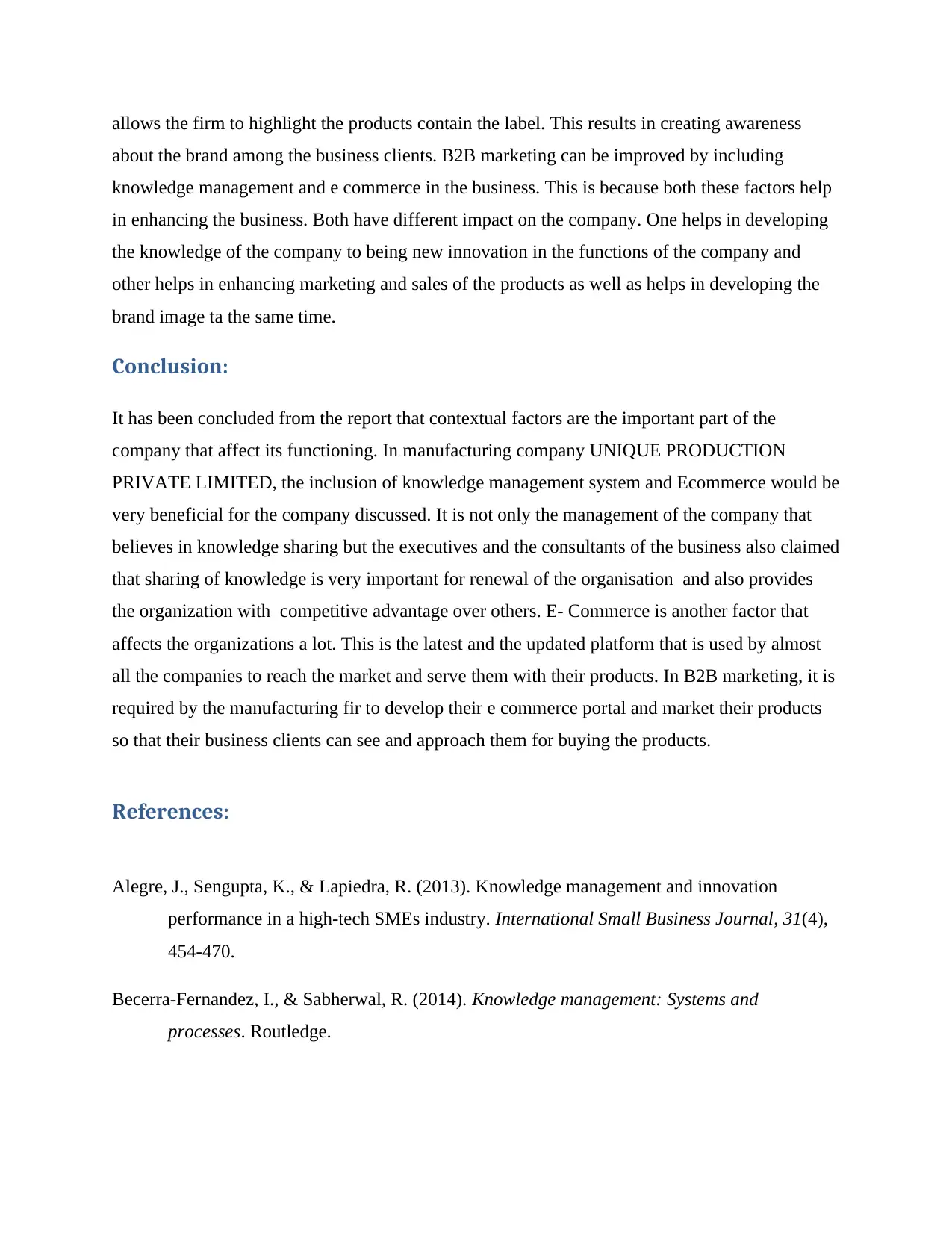
allows the firm to highlight the products contain the label. This results in creating awareness
about the brand among the business clients. B2B marketing can be improved by including
knowledge management and e commerce in the business. This is because both these factors help
in enhancing the business. Both have different impact on the company. One helps in developing
the knowledge of the company to being new innovation in the functions of the company and
other helps in enhancing marketing and sales of the products as well as helps in developing the
brand image ta the same time.
Conclusion:
It has been concluded from the report that contextual factors are the important part of the
company that affect its functioning. In manufacturing company UNIQUE PRODUCTION
PRIVATE LIMITED, the inclusion of knowledge management system and Ecommerce would be
very beneficial for the company discussed. It is not only the management of the company that
believes in knowledge sharing but the executives and the consultants of the business also claimed
that sharing of knowledge is very important for renewal of the organisation and also provides
the organization with competitive advantage over others. E- Commerce is another factor that
affects the organizations a lot. This is the latest and the updated platform that is used by almost
all the companies to reach the market and serve them with their products. In B2B marketing, it is
required by the manufacturing fir to develop their e commerce portal and market their products
so that their business clients can see and approach them for buying the products.
References:
Alegre, J., Sengupta, K., & Lapiedra, R. (2013). Knowledge management and innovation
performance in a high-tech SMEs industry. International Small Business Journal, 31(4),
454-470.
Becerra-Fernandez, I., & Sabherwal, R. (2014). Knowledge management: Systems and
processes. Routledge.
about the brand among the business clients. B2B marketing can be improved by including
knowledge management and e commerce in the business. This is because both these factors help
in enhancing the business. Both have different impact on the company. One helps in developing
the knowledge of the company to being new innovation in the functions of the company and
other helps in enhancing marketing and sales of the products as well as helps in developing the
brand image ta the same time.
Conclusion:
It has been concluded from the report that contextual factors are the important part of the
company that affect its functioning. In manufacturing company UNIQUE PRODUCTION
PRIVATE LIMITED, the inclusion of knowledge management system and Ecommerce would be
very beneficial for the company discussed. It is not only the management of the company that
believes in knowledge sharing but the executives and the consultants of the business also claimed
that sharing of knowledge is very important for renewal of the organisation and also provides
the organization with competitive advantage over others. E- Commerce is another factor that
affects the organizations a lot. This is the latest and the updated platform that is used by almost
all the companies to reach the market and serve them with their products. In B2B marketing, it is
required by the manufacturing fir to develop their e commerce portal and market their products
so that their business clients can see and approach them for buying the products.
References:
Alegre, J., Sengupta, K., & Lapiedra, R. (2013). Knowledge management and innovation
performance in a high-tech SMEs industry. International Small Business Journal, 31(4),
454-470.
Becerra-Fernandez, I., & Sabherwal, R. (2014). Knowledge management: Systems and
processes. Routledge.
⊘ This is a preview!⊘
Do you want full access?
Subscribe today to unlock all pages.

Trusted by 1+ million students worldwide
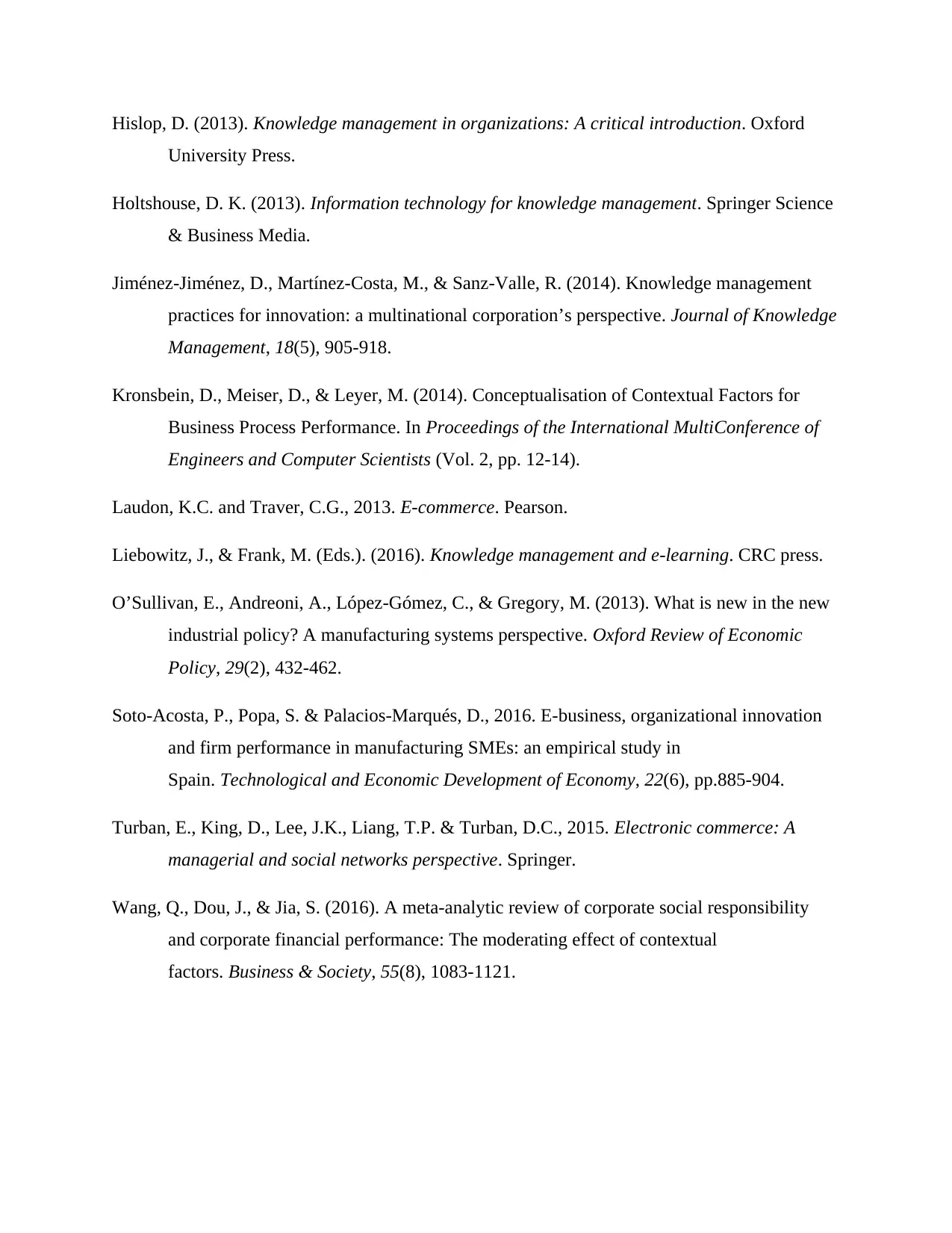
Hislop, D. (2013). Knowledge management in organizations: A critical introduction. Oxford
University Press.
Holtshouse, D. K. (2013). Information technology for knowledge management. Springer Science
& Business Media.
Jiménez-Jiménez, D., Martínez-Costa, M., & Sanz-Valle, R. (2014). Knowledge management
practices for innovation: a multinational corporation’s perspective. Journal of Knowledge
Management, 18(5), 905-918.
Kronsbein, D., Meiser, D., & Leyer, M. (2014). Conceptualisation of Contextual Factors for
Business Process Performance. In Proceedings of the International MultiConference of
Engineers and Computer Scientists (Vol. 2, pp. 12-14).
Laudon, K.C. and Traver, C.G., 2013. E-commerce. Pearson.
Liebowitz, J., & Frank, M. (Eds.). (2016). Knowledge management and e-learning. CRC press.
O’Sullivan, E., Andreoni, A., López-Gómez, C., & Gregory, M. (2013). What is new in the new
industrial policy? A manufacturing systems perspective. Oxford Review of Economic
Policy, 29(2), 432-462.
Soto-Acosta, P., Popa, S. & Palacios-Marqués, D., 2016. E-business, organizational innovation
and firm performance in manufacturing SMEs: an empirical study in
Spain. Technological and Economic Development of Economy, 22(6), pp.885-904.
Turban, E., King, D., Lee, J.K., Liang, T.P. & Turban, D.C., 2015. Electronic commerce: A
managerial and social networks perspective. Springer.
Wang, Q., Dou, J., & Jia, S. (2016). A meta-analytic review of corporate social responsibility
and corporate financial performance: The moderating effect of contextual
factors. Business & Society, 55(8), 1083-1121.
University Press.
Holtshouse, D. K. (2013). Information technology for knowledge management. Springer Science
& Business Media.
Jiménez-Jiménez, D., Martínez-Costa, M., & Sanz-Valle, R. (2014). Knowledge management
practices for innovation: a multinational corporation’s perspective. Journal of Knowledge
Management, 18(5), 905-918.
Kronsbein, D., Meiser, D., & Leyer, M. (2014). Conceptualisation of Contextual Factors for
Business Process Performance. In Proceedings of the International MultiConference of
Engineers and Computer Scientists (Vol. 2, pp. 12-14).
Laudon, K.C. and Traver, C.G., 2013. E-commerce. Pearson.
Liebowitz, J., & Frank, M. (Eds.). (2016). Knowledge management and e-learning. CRC press.
O’Sullivan, E., Andreoni, A., López-Gómez, C., & Gregory, M. (2013). What is new in the new
industrial policy? A manufacturing systems perspective. Oxford Review of Economic
Policy, 29(2), 432-462.
Soto-Acosta, P., Popa, S. & Palacios-Marqués, D., 2016. E-business, organizational innovation
and firm performance in manufacturing SMEs: an empirical study in
Spain. Technological and Economic Development of Economy, 22(6), pp.885-904.
Turban, E., King, D., Lee, J.K., Liang, T.P. & Turban, D.C., 2015. Electronic commerce: A
managerial and social networks perspective. Springer.
Wang, Q., Dou, J., & Jia, S. (2016). A meta-analytic review of corporate social responsibility
and corporate financial performance: The moderating effect of contextual
factors. Business & Society, 55(8), 1083-1121.
1 out of 7
Related Documents
Your All-in-One AI-Powered Toolkit for Academic Success.
+13062052269
info@desklib.com
Available 24*7 on WhatsApp / Email
![[object Object]](/_next/static/media/star-bottom.7253800d.svg)
Unlock your academic potential
Copyright © 2020–2025 A2Z Services. All Rights Reserved. Developed and managed by ZUCOL.





